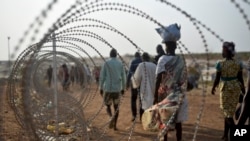The United Nations refugee agency reports hunger as well as ongoing conflict are driving tens of thousands of South Sudanese to flee their war-torn country into Sudan in search of food and security.
The United Nations reports 2.3 million people in South Sudan have been forced to flee their homes since civil war erupted in December 2013. Nearly three-quarters of a million of those displaced have gone to neighboring countries as refugees.
While conflict and violence have been driving the forced displacement, a new element behind the recent flight has emerged. The world body’s refugee agency, UNHCR, reports a serious shortage of food, caused by the ongoing conflict and deteriorating economic conditions, is prompting an increasing number of people to head to neighboring Sudan.
UNHCR spokesman Adrian Edwards says the situation is particularly bad in the northwestern states of Northern Bahr el-Ghazal and Warrap. He says some 38,000 people have fled into the East Darfur and South Darfur regions of Sudan over the past two months.
‘A crisis of food security’
Edwards says people arriving in Sudan are in poor condition, with many having risked their lives en route. He tells VOA he fears the exodus from South Sudan will grow as the nutritional situation rapidly deteriorates.
“Insecurity is a major aspect of this; but, increasingly, food insecurity as well is causing more people to be on the move. They are among 2.8 million people now officially classified as facing a crisis of food security in South Sudan,” he says.
Edwards says people clearly are suffering the effects of being without sufficient food. He says global acute malnutrition rates have risen above the emergency threshold of 15 percent. He says several inter-agency assessment missions are underway in parts of Sudan to determine how best to meet refugee needs.
He says a composite picture is emerging from preliminary assessments and that the situation is universally desperate, with many refugees having traveled for up to four weeks under difficult circumstances.
He notes many children have been separated from their families en route and that the newly arriving refugees are living in overcrowded conditions with many being sick and in need of medical care.






